We’re excited to announce new feature updates for Clarity Human Services, summarized below.
Release Schedule:
- All Training Sites: Monday, October 18, 2021
- All Production Sites: Monday, November 1, 2021
Updated — New Load Spinner
Overview: When a screen initially loads, fields that are dependent on Display Constraints may briefly appear. Consequently, we have added a spinning icon to the following types of screens to indicate that they are loading:
- All screens that have Display Constraints
- All screens where data can be entered and saved, such as Program Setup screens and client screens
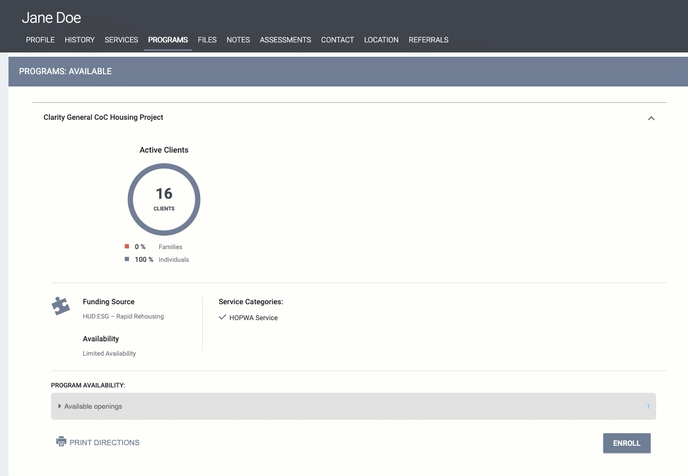
Required Action: None.
Updated — Constraints Order Dependency Update
Overview: Display Constraints are often set up to display a field according to the value of a field above it, as shown in the example below, where the display of Field B depends on the value of Field A.

However, sometimes Display Constraints are set up to display a field according to the value of a field below it, as in the example below, where the display of Field 1 depends on the value of Field 2. This update ensures that Display Constraints that are set up in this manner will display correctly.

Required Action: None.
Updated — Recover Deleted Data View in Outreach
Overview: Previously, in the RECOVER DELETED DATA function in the Outreach map, clicking on a deleted Encampment would take you to the PERSONS list, where you would need to click the gear icon to open the Encampment profile to access the RESTORE button. Now, clicking a deleted Encampment on the map will take you directly to the Encampment profile to access the RESTORE button.
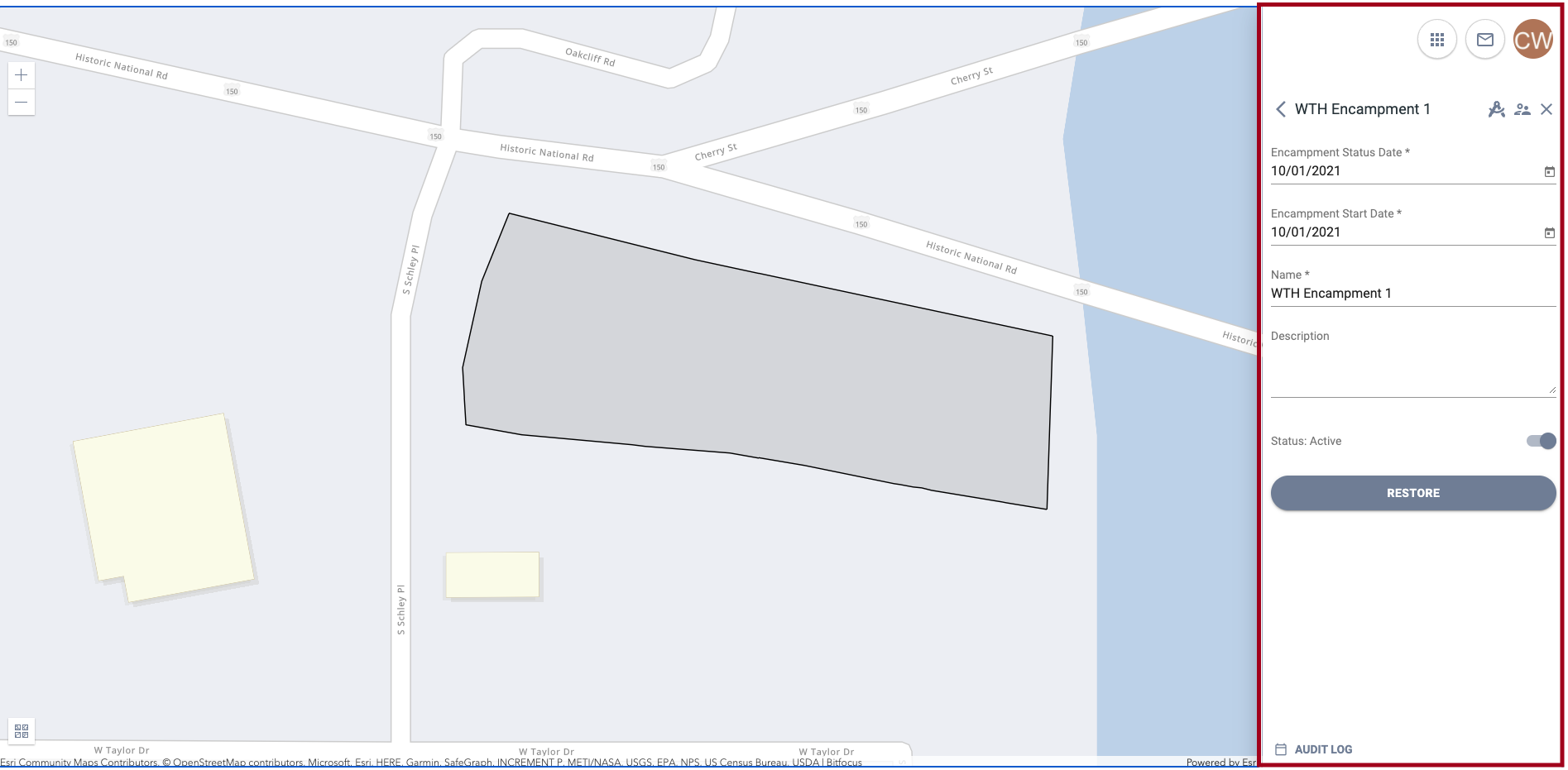
Required Action: None.
Updated — Existing Access Role Types
Overview: The Role Type will now be read-only for access roles that have been saved in the system. This update ensures that the Role Type, which has access to specific permissions, cannot be changed for existing access roles.
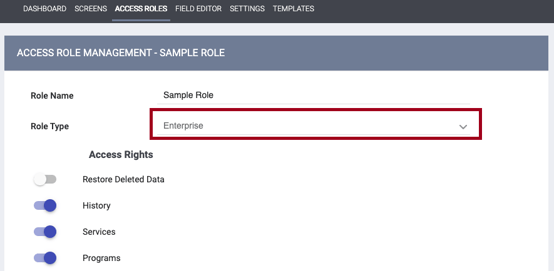
Required Action: None.
New Inventory Features
Inventory Tab
Overview: INVENTORY now includes a map view that allows you to view Unit details and locations. Please refer to our Inventory Tab article in the Help Center for more information.
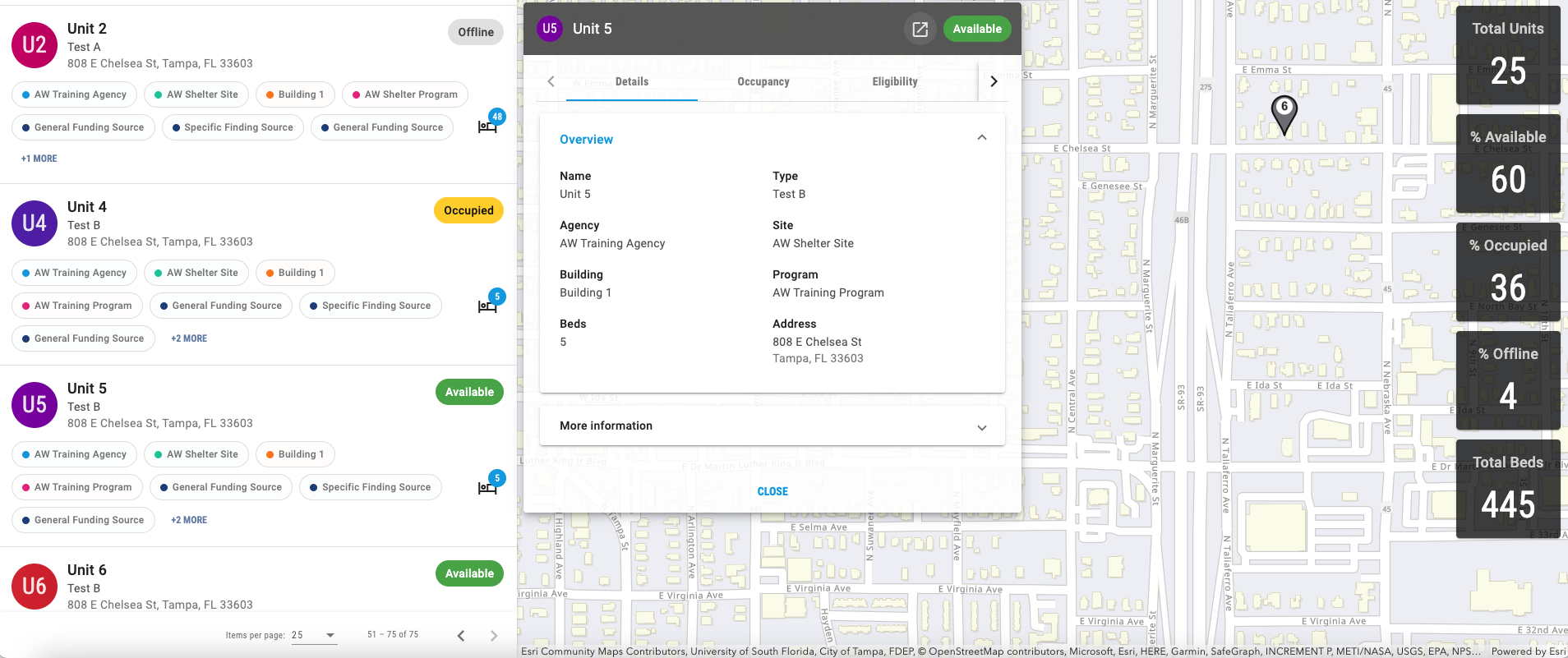
Required Action: Please enable the permissions and settings described in the Inventory Tab article for any users in your community who should have access to the Inventory Tab.
Unit Queue
Overview: INVENTORY now includes the Unit Queue functionality within the REFERRALS tab. This new feature gives users the ability to refer clients to specific Units based on Unit Eligibility criteria and Unit availability. Please refer to our Unit Queue article in the Help Center for more information.
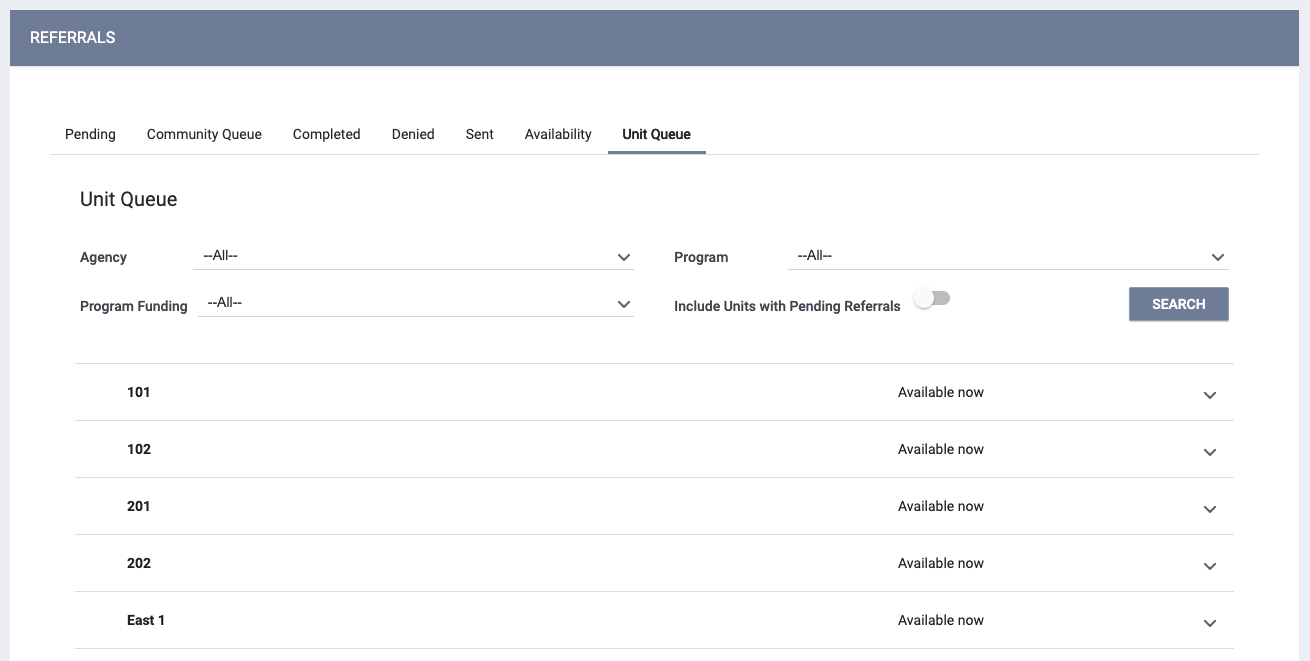
Required Action: Please enable the permissions and settings described in the Unit Queue article for any users in your community who should have access to the Unit Queue.
Updated Inventory Features
Trash Can Icon Hidden
Overview: On the UNITS page (SITES > Housing Inventory > select a Site to edit > Units & Beds), the system hides the trash can icon for Units that have a status of “Pending Occupation” or “Occupied” to prevent those records from being deleted.

On the MODIFY UNIT CONFIGURATION TYPE page (SITES > Housing Inventory > select a Site to edit > Unit Configuration Type), the system hides the trash can icon for Programs that were created by an agency other than the one that created the Unit Configuration Type.

Note: The trash can icon will not be hidden for System Administrators; however, if System Administrators are not currently switched into the agency that created the Unit Configuration Type, they will need to switch into that agency before they can see the trash can.
Required Action: None.
Header Updates
Overview: Within the MODIFY UNIT page, we have updated the Current Configurations header to Current Configuration since there will always be only one current Unit Configuration assigned to a Unit at one time.

On the MODIFY UNIT Unit page (accessed by selecting a Unit to edit on the UNITS page), we have renamed the As Of column to Start Date.

We have updated the header for the Configuration History page to UNIT CONFIGURATION HISTORY, and we have updated the As Of column to Start Date.

Also, clicking CANCEL on the ADD NEW HISTORY RECORD page will redirect you to the Configuration History list.
Required Action: None.
Restrictions on Deleting
Overview: We have introduced the following logic for the deletion of Sites, Buildings, Unit Configuration Types, and Units:
- If all client interactions* affecting a Unit are deleted, then the Unit itself can be deleted.
- If all client interactions associated with all Unit Configuration Types have been deleted, then the Unit Configuration Type can be deleted.
- If all client interactions affecting all Units within a building are deleted, then the Building itself can be deleted, as long as there hasn’t been any other client activity associated with the Building.
- If all client interactions affecting all Buildings within a Site are deleted, then the Site can be deleted.
*"Client interactions” are any of the possible ways a client could interact with a Unit, such as a referral, an enrollment, etc.
Before you can delete a Site, you must delete all of its Buildings; before you can delete a Building, you must delete all of its Unit Configuration Types; before you can delete a Unit Configuration Type, you must delete all of its Units. In other words, start by deleting Units first, then Unit Configuration Types, then Buildings, then Sites.
Required Action: None
Update to Programs & Projects Count
Overview: We have updated the Programs & Projects count in the Site Resources sidebar so that it is not a duplicative count. For example, even though the image below shows five Programs, the count shown in the sidebar is “4” (outlined in red) because one of the Programs (Sample Program) is listed twice, due to it being assigned to two different Unit Configuration Types in the list.
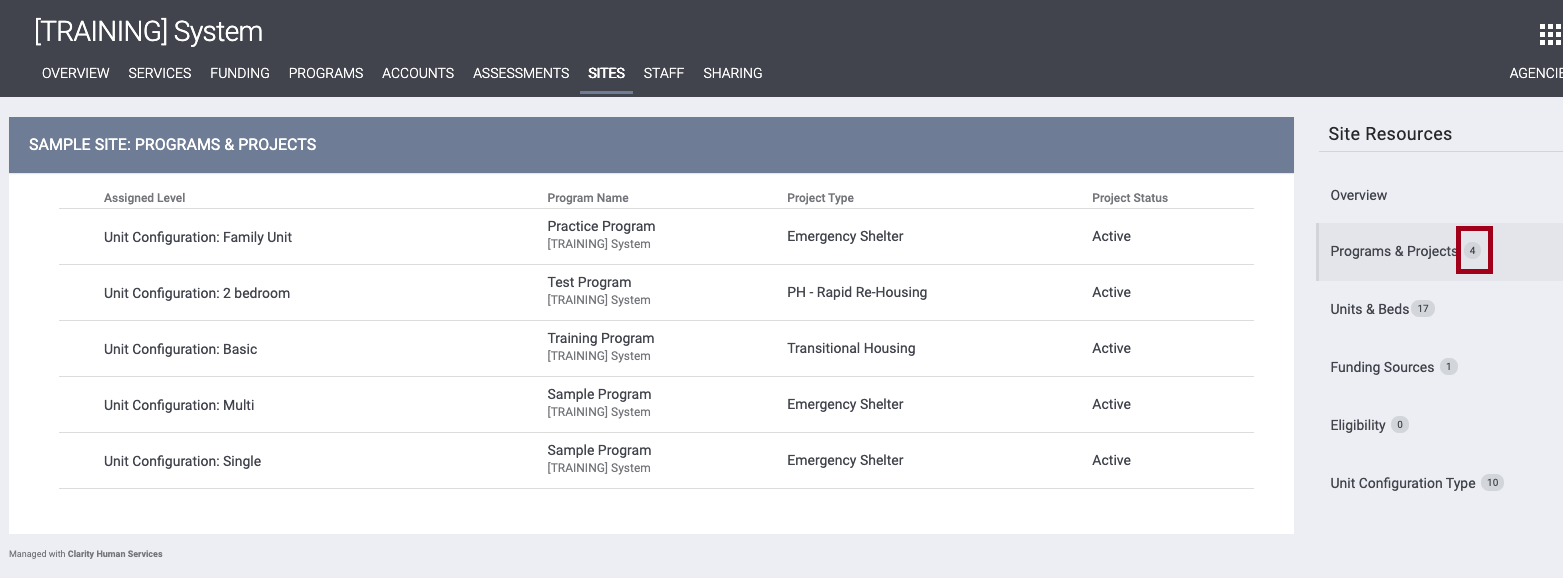
Required Action: None.
Occupancy History Page
Overview: On the MODIFY UNIT page, an Occupancy History option is available in the right sidebar. Select this option to view a Unit’s occupancy history, chronologically stored, with the ability to view the project/program in which the relevant clients were enrolled during that stay.
The occupancy records appear in chronological order, with the most recent listing at the top. The Start Date and End Date columns are sortable. Clicking on the “Start Date” and “End Date” column headers will sort the rows by date.
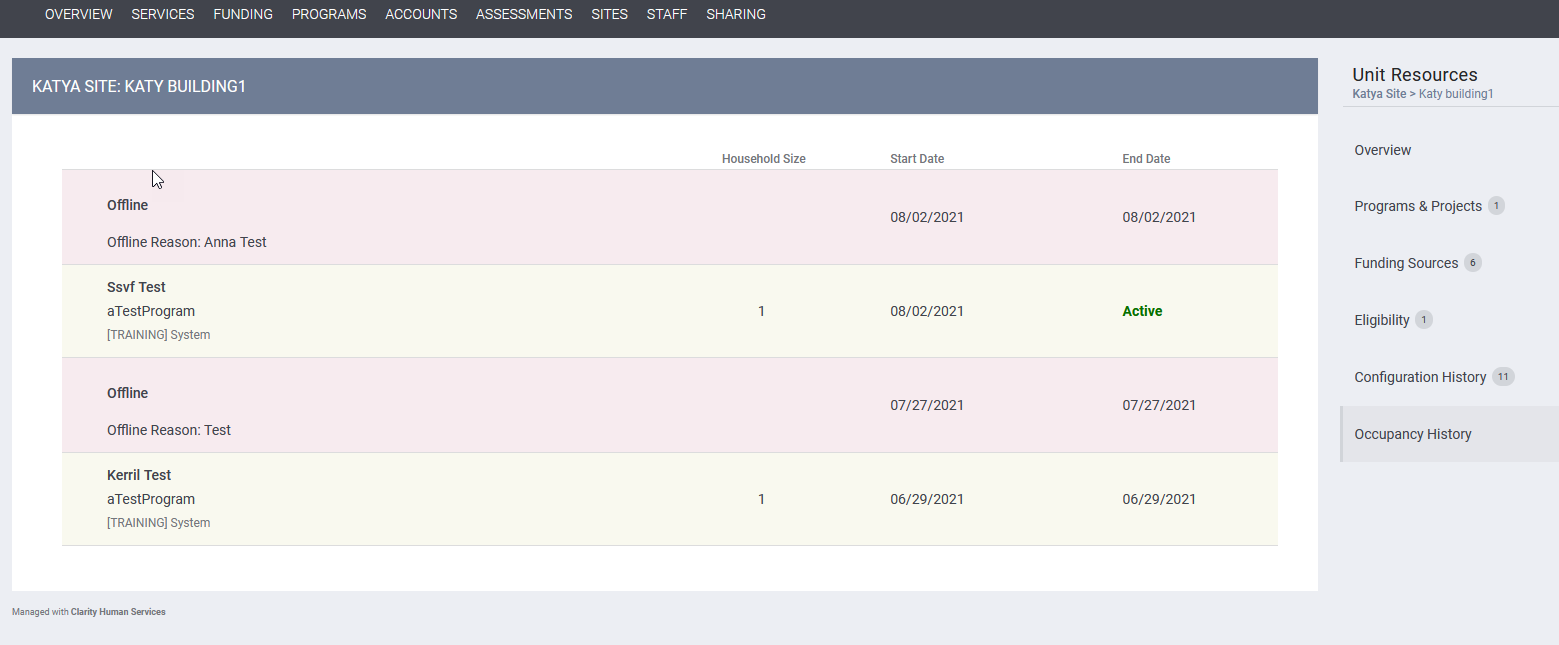
Required Action: None
Referral Activity
When a referral is connected to a Unit, the referral will appear in the Activity column of the referral’s HISTORY section as “Unit Queue Program Referral”: “Unit Name,” “Program Name,” “Agency Name.”

Required Action: None.
Connect to the Unit via Community Queue
Overview: We have added the ability to connect a referral to a Unit via the Community Queue, using the following process:
- Select a referral in the Community Queue to modify. Scroll to the REASSIGN section.

- Select a Program
- If the Persistent Management toggle in REFERRAL SETTINGS is enabled, the options listed in the Program drop-down list will be Programs that are linked to the available units.
- Select a Unit from the Opening drop-down list
- By default the Opening list includes only Units assigned to the selected Program for which the client meets the full eligibility criteria (including inherited eligibility).
- If you enable the Eligibility Override toggle, the Opening list will include all Units within the system that are assigned to the selected Program.
- Click SAVE CHANGES to create a pending referral.
Required Action: None.
Adding Unit Name to Referral Information
Overview: We have added the Unit name to the display in the following areas:
- When a referral shown in the HISTORY tab is associated with a Unit referral, the sуstem lists the Unit name as “Referral: Unit Name, Program Name.”
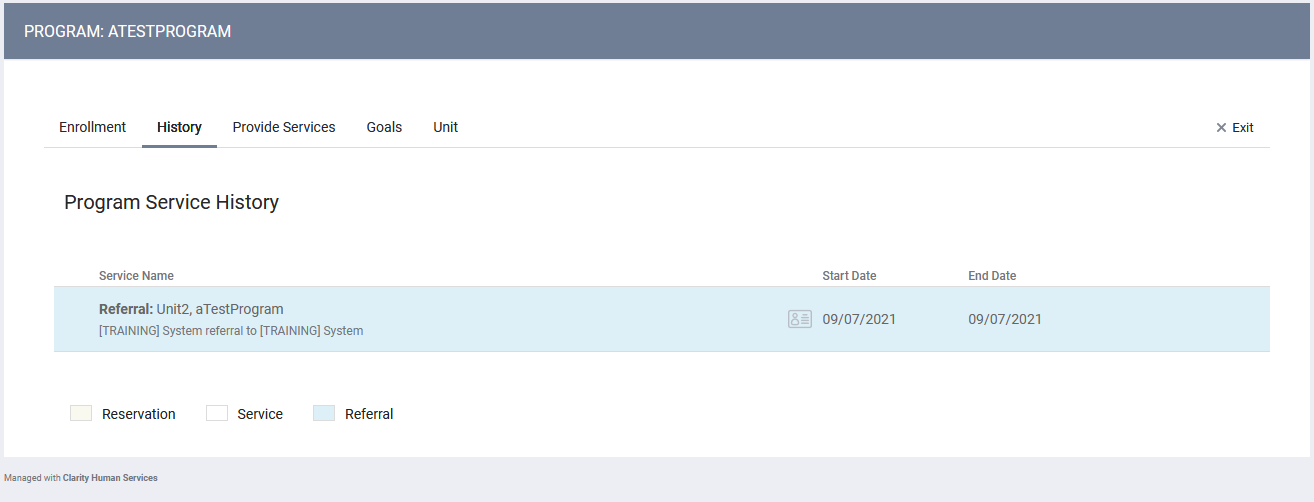
- When a Unit referral is displayed on the REFERRAL: EDIT page, a Referred Unit line appears above the Referred Program line.
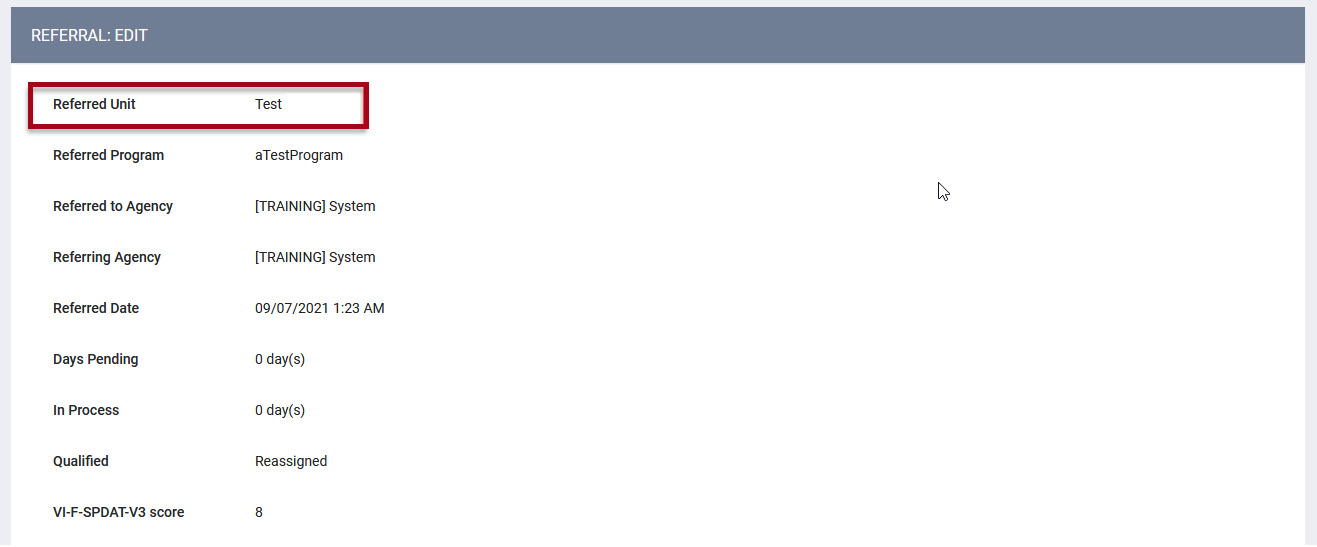
Required Action: None.
Housing Inventory Site Display
Overview: When you select a Program to edit under MANAGE > Programs and click on Bed & Unit Inventory Information in the sidebar, you will only see the HOUSING INVENTORY SITE section if one of the following is true:
- Use Persistent Inventory Calculated Records is enabled on the Program setup.
OR
- Housing Inventory records are associated with the Program.
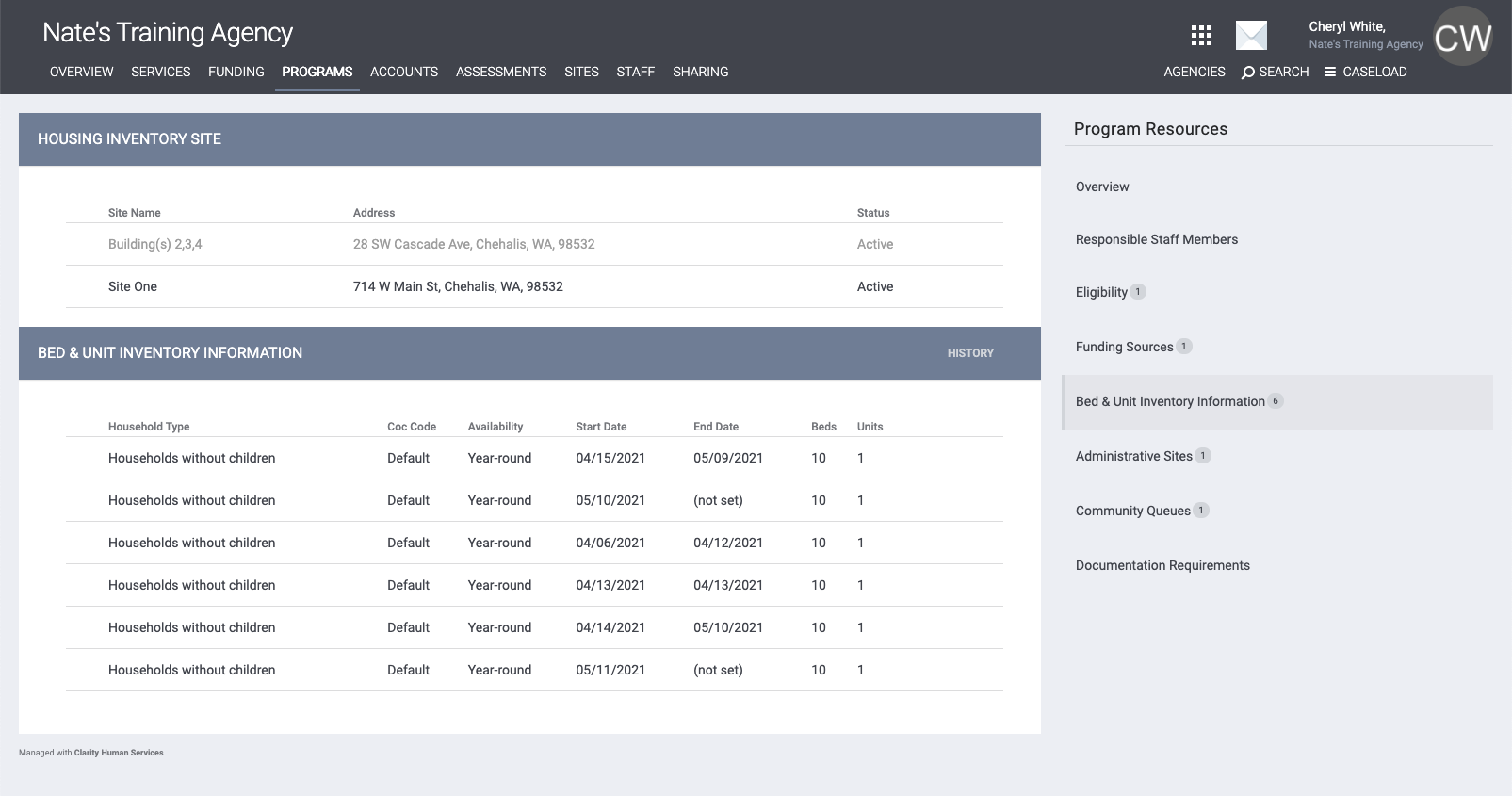
Required Action: None.
Create Warning if Project Type for Program and Unit Configuration Type Do Not Match
Overview: If you add a Program to a Unit Configuration Type, the project type of the Program:

should match the project type of the Unit Configuration Type:
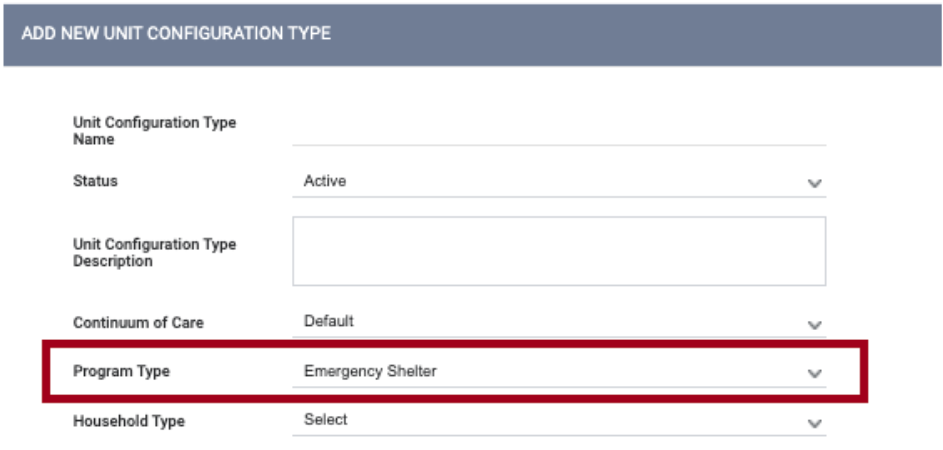
If the project types don’t match, you will see the following banner alert:

Required Action: None.
New and Updated Help Center Resources
We’ve either updated or created the following articles in response to this Clarity Human Services update. To receive monthly emails on Help Center updates, follow the Clarity Human Services New Features Updates section of our Help Center.
